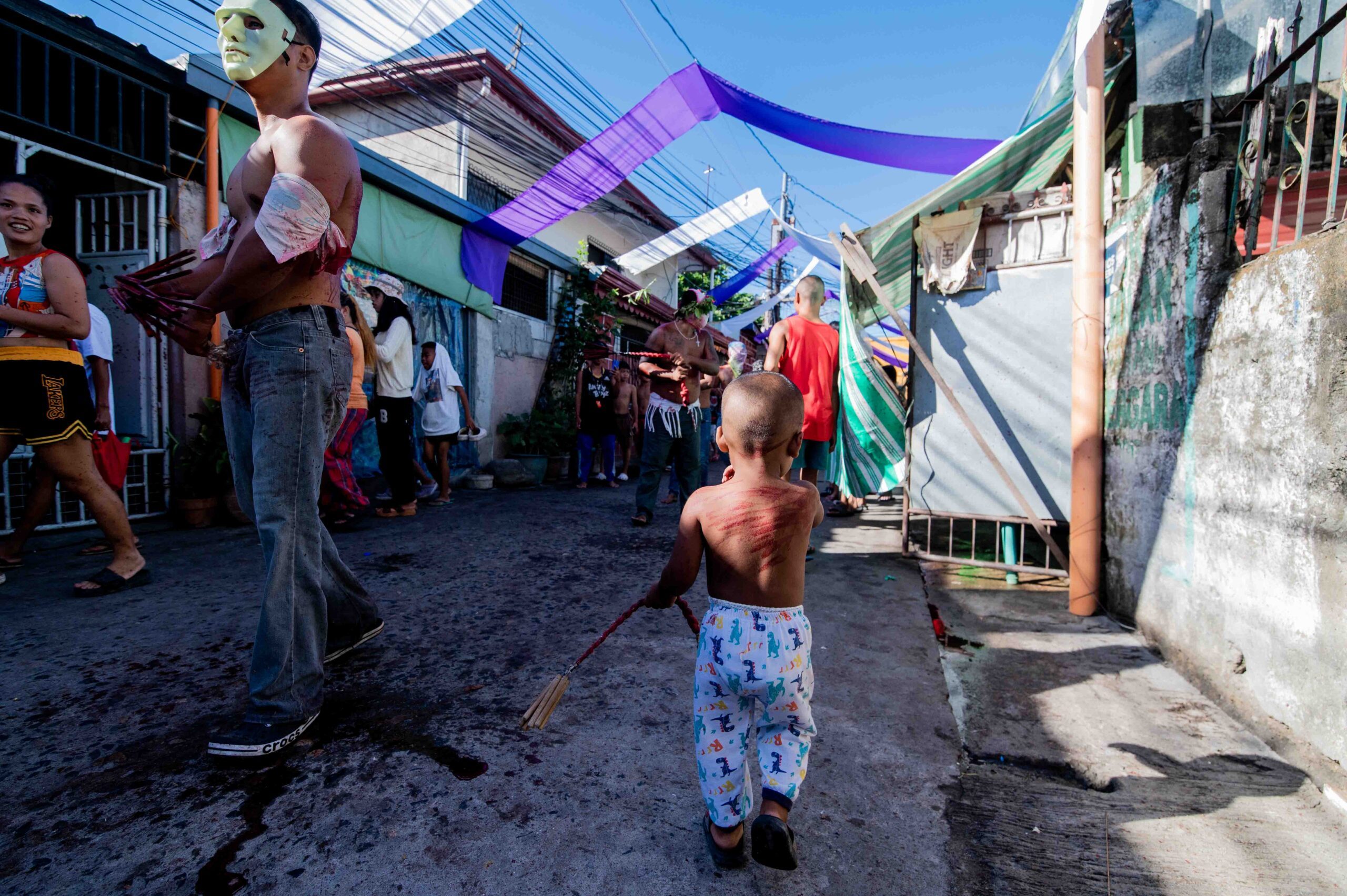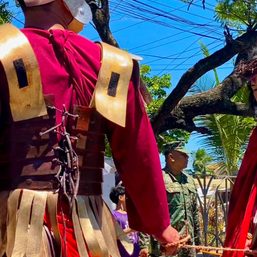SUMMARY
This is AI generated summarization, which may have errors. For context, always refer to the full article.

ANGELES CITY, Philippines – A two-year old boy was seen on a video holding a small souvenir bamboo whip, mimicking self-flagellation with a group of mandarame (flagellants) on Maundy Thursday, March 28, in Barangay Lourdes Northwest in this city in Pampanga province.
Some of the young boys played around the souvenir whip on the street while others participated in beating flagellants once they reached the village’s Pabasa ng Pasyon (Chanting of the Passion).
The residents said the boys who joined in whipping were usually relatives of the mandarame, while those who played with the whip would only amuse themselves in the act.
“You cannot take part in the beating if the flagellant doesn’t know you. The boys come here with the flagellants,” Jenny, a resident looking over at the Pabasa, said.

The local church, Santa Teresita Parish, incorporates the discussions on Cuaresma traditions through homilies and conversations. Church coordinator and liturgist Nikko Ramos said the parishioners, even non-Roman Catholic faithfuls, must remember the Holy Week traditions with respect.
“It’s panata not fun-nata. Definitely we are going to look deeply into the tradition. May gabay dapat. Nabigla nga ako sa video kasi first time kong makita na may bata,” Ramos said. “Hindi natin alam anong opinion ng parent niya dito, pero nakita natin na nilagyan din ng dugo, parang lumalabas na pinaglalaruan ang tradition.“
(It’s “panata” not “fun-nata.” Definitely we are going to look deeply into the tradition. There should be guidance. I was surprised to see the video because it’s my first time to see a kid. We don’t know what the opinions of his parents but we also see here that they smeared him with blood. It looked like the tradition is being played with.)
The boy’s back was smeared with his flagellant uncle’s blood. Photos of him after the event, shared with Rappler, showed the boy didn’t have bruises or sores.
Part of panata?
Maryanne, not her real name, also bought a souvenir whip for her five-year old son to stop him from crying.
Maryanne, who lives in nearby Barangay Pampang, said she would encourage his son to self-flagellate when he grows older. She said self-flagellation had been part of their family’s “panata” (vow).
Luisito Castillo, 53, has been selling bamboo whips along the streets on the way to the village’s Pabasa. He said he wasn’t able to sell souvenir whips as they had been selling fast.
A souvenir whip costs P150 to P200 along the streets of the barangay. While the larger whip used for self-flagellation costs P500 to P750.
“Ing pamamyalung palaspas ena man malyari. Balu da yan. Pero nung ing anak mamyalung la mu, normal na mu yan keni. Emi no man ren abawal ren, aliwa naman ikami ing kayi (pengari),” Castilo, who is also a Catholic, said.
“Deng kasing anak emi no man abawal. Unti yan dininan de pang daya, ena man masanting. Ena man pyalung yan,” he added.
(Playing as one of the flagellants is not allowed. They know that. But if it’s the children who are playing, that is normal here. We can’t stop them. We are not the parents. We can’t just stop the children. Like that in the video, they even added blood, it is not good. This is not a game.)
Castillo has been selling bamboo whips every year before joining the Good Friday penitents self-flagellating. For Castillo, this has been his devotion every year as a Catholic and for his children.
Begin with parents
Mechelle Hallili, Lourdes Northwest Elementary School teacher, said the discipline and respect of the tradition should begin at home and through the parents.
Being one of the elementary teachers in the village, she admits how challenging it is to teach the parents on how to discipline their children.
“Kasi patche ing anak penganyan ne at ali me entabayanan, kailangan sabyanan me na apin ing tradisyon, respetuwan ta ya. Pero ali dapat as pyalung kasi itang simbolu na papakit ta ya. Pero most of the parents nowadays karin magkayi ing negligence da. Ali de aexplain masalese nanu ing tradisyon ta,” Halili said.
“Medyu masakit na talnan ta la o sabyanan ta la reng pengari. Turu ta la mu na ali ya pyalung at ede lalako ing respetu keng tradisyon,” she aded.
(Because if a child did the flagellation and without guidance, there should be someone to tell them that this is our tradition and we should respect it. That this is not a game because we are trying to show the symbol. However, here lies the negligence from most of the parents. They cannot explain properly what our tradition is. It is quite challenging to hold the parents or reprimand them. Let’s just teach them that this is not a game, don’t lose the respect.)
The Angeles City government reconvened the Local Council for Protection of Children (LCPC) to revisit and strengthen the city’s policies on child protection.
The existing policies and procedures concerning child welfare and protection will be thoroughly reviewed and implemented to supplement the guidance at the local level for the youth. – Rappler.com
1 comment
How does this make you feel?




![[OPINION] Clark International Airport, one of world’s most beautiful airports, is badly underutilized](https://www.rappler.com/tachyon/2024/05/clark-airport-underutilized-may-28-2024.jpg?resize=257%2C257&crop=560px%2C0px%2C720px%2C720px)
![[The Wide Shot] Peace be with China](https://www.rappler.com/tachyon/2024/07/wideshot-wps-catholic-church.jpg?resize=257%2C257&crop=311px%2C0px%2C720px%2C720px)
![[OPINION] A critique of the CBCP pastoral statement on divorce](https://www.rappler.com/tachyon/2024/07/TL-cbcp-divorce-statement-july-19-2024.jpg?resize=257%2C257&crop=285px%2C0px%2C722px%2C720px)


![[The Wide Shot] Was CBCP ‘weak’ in its statement on the divorce bill?](https://www.rappler.com/tachyon/2024/07/cbcp-divorce-weak-statement.jpg?resize=257%2C257&crop=258px%2C0px%2C719px%2C720px)





![[REFLECTION] Mary, Mother of the West Philippine Sea](https://www.rappler.com/tachyon/2024/07/may-mother-west-ph-sea-july-19-2024.jpg?resize=257%2C257&crop=293px%2C0px%2C751px%2C750px)
![[OPINION] Ignorance and prejudice](https://www.rappler.com/tachyon/2024/07/tl-ignorance-and-prejujdice.jpg?resize=257%2C257&crop_strategy=attention)

![[WATCH] Binignit for Holy Week](https://www.rappler.com/tachyon/2021/03/binignit.jpg?resize=257%2C257&crop_strategy=attention)



Like everything else, tradition can evolve. Children imitate what they see and hear. They mirror the reality they see. What is tradition anyway?